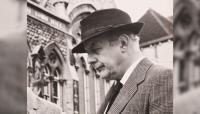 Add My Company
Add My Company
Sign In

The late Poet Laureate, Sir John Betjeman, carried on writing into old age, despite his ten-year battle with Parkinson’s. Up until his death in 1984, at the age of 77, the legendary poet let nothing get in the way of his poignant and beautiful verses.
Considered an honorary Cornishman, despite being born in London, Sir John went to live in Trebetherick, near Polzeath, in adulthood, after spending many childhood holidays in the tranquil county.
Known as Cornwall’s Poet Laureate, due to his lifelong love of the region, his writing reflected this, with his autobiography, Summoned by Bells, describing his childhood holidays, and poems such as Seaside Golf and Cornish Cliffs relating to his experiences.
Sir John Betjeman’s life
Sir John was born into a prosperous London family in August 1906. His parents, Ernest and Mabel Betjeman, manufactured silverware from their business premises on Pentonville Road, supplying furniture and accessories to wealthy Victorian families.
Ernest invested in property in Cornwall, where the family enjoyed regular holidays for many years. Sir John was inspired to write poetry from a very early age as a result, and as an adult, while known as a champion of Victorian and Edwardian architecture, he was also a prolific writer, penning guidebooks about Cornwall, alongside his essays and poetry.
A broadcaster and journalist, he presented several TV series, including the BBC documentary about Cornwall, One Man’s County, in 1964.
Sir John was awarded a CBE in 1960 and a knighthood in 1969. In 1972, he became Poet Laureate, which is the highest honour that the British government can bestow on a writer. It is granted only to those whose work is considered to be of “national significance” – the Poet Laureate writes poems about major public national events.
Sir John, who was Poet Laureate for 12 years until his death, wrote the Jubilee Hymn to celebrate the silver jubilee of Queen Elizabeth II in 1977, which was undoubtedly one of the highlights of his career.
Sir John’s battle with Parkinson’s
The Poet Laureate’s battle with Parkinson’s began in 1974. Initially, the early symptoms didn’t affect his work to a significant degree.
Involuntary shaking, known as tremors; slow movement; and inflexible, stiff muscles are normally first noticed in people aged over 50. As the disease progresses, other physical and psychological problems can develop including depression, anxiety, balance problems that can lead to a fall, memory problems and difficulty in sleeping.
Sir John found his work was increasingly impacted by the gradual onset of the disease over the last ten years of his life. He struggled to maintain his correspondence as Poet Laureate, but still did his utmost to carry on.
He was helped by the American collector, Duncan Andrews, of New York, who had begun collecting poems by Sir John in the 1950s. Subsequently, Andrews amassed a great collection of his work and met the poet as a result.
Andrews became friends with Sir John and maintained a relationship with him throughout his illness. They corresponded regularly, until the poet began finding it hard to write letters due to his symptoms.
When Sir John was no longer able to maintain his correspondence as Poet Laureate, his friend Andrews wrote letters on his behalf – he catalogued all his exhibits of Sir John’s work and wrote many explanatory notes to ensure its cohesion for future collectors and researchers.
After his initial diagnosis, Sir John wrote one of his final major poetry collections, A Nip in the Air, in 1974. It ended with the epitaph:
“Now if the harvest is over
And the world cold
Give me the bonus of laughter
As I lose hold.”
The poignant verse became his epitaph, as he seemed to accept the reality of his condition and the impact it was going to have on his life. During his final years, he was prominently featured in the campaigns of the charity, Parkinson’s UK.
When the Cornish Poet Laureate died on 19th May 1984, at his home in Treen, following a ten-year battle with Parkinson’s, his great poems became a poignant legacy of his life’s work. His Collected Poems has sold more than 2.5 million copies to date.
At Sir John’s memorial service at Westminster Abbey, King Charles III (then Prince Charles) read a lesson, and a monument was later placed in the Abbey’s Poets’ Corner.
Links with Parkinson’s UK
Sir John helped to raise the profile of Parkinson’s UK by working publicly with the charity after his diagnosis. The charity helps people affected by Parkinson’s by offering both practical and emotional support at all stages of the disease.
A Parkinson’s support centre in Cornwall is named after the poet. The John Betjeman Centre, at Southern Way, Wadebridge, provides support for people with the disease. The Parkinson’s Drop-in runs a varied programme, including guest speakers who discuss both Parkinson’s and other general subjects. Like Parkinson’s UK, the Betjeman Society is also committed to keeping the poet’s great legacy alive.
Movement problems also affect the quality of sleep and people may need help to get in and out of bed, while rigidity may make it challenging for them to turn over. A specialist bed can help those who are at risk of falling out of bed, reducing the risk of injury and helping to improve quality of life.
For more information on John Betjeman: A Poet’s Battle with Parkinson’s talk to Kinderkey Healthcare Ltd
Enquire Now
List your company on FindTheNeedle.

